Best Elixir Programming Guides to Buy in March 2026

Elixir in Action, Third Edition


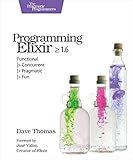
Programming Elixir ≥ 1.6: Functional |> Concurrent |> Pragmatic |> Fun


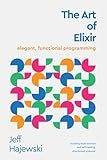
The Art of Elixir: elegant, functional programming


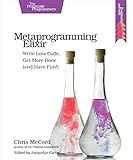
Metaprogramming Elixir: Write Less Code, Get More Done (and Have Fun!)


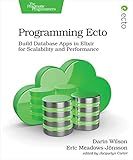
Programming Ecto: Build Database Apps in Elixir for Scalability and Performance



Elixir Patterns: The essential BEAM handbook for the busy developer


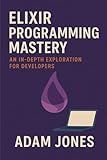
Elixir Programming Mastery: An In-Depth Exploration for Developers



Adopting Elixir: From Concept to Production


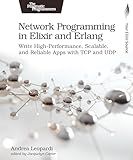
Network Programming in Elixir and Erlang: Write High-Performance, Scalable, and Reliable Apps with TCP and UDP


In Elixir, you can iterate through a list of maps using the Enum module's functions. One common approach is to use the Enum.map/2 function, which applies a given function to each element of the list and returns a new list containing the results.
For example, suppose you have a list of maps representing products:
products = [ %{name: "Product 1", price: 10.99}, %{name: "Product 2", price: 20.50}, %{name: "Product 3", price: 15.75} ]
You can iterate through this list and extract the names of the products using Enum.map/2 like this:
product_names = Enum.map(products, fn %{name: name} -> name end)
This will result in a new list containing the names of the products:
["Product 1", "Product 2", "Product 3"]
You can also use other functions from the Enum module, such as Enum.each/2 or Enum.reduce/3, depending on the specific operation you want to perform on each map in the list. Just remember that these functions are immutable, meaning they won't modify the original list but will return a new one with the desired changes.
What is the role of the base case in recursive functions when iterating through a list of maps in Elixir?
The base case in a recursive function is important when iterating through a list of maps in Elixir because it defines the condition under which the recursion should stop. In the context of iterating through a list of maps, the base case would typically involve checking if the list is empty or if there are no more maps to process.
By defining a base case in the recursive function, you ensure that the recursion stops once all the maps in the list have been processed, thus preventing an infinite loop. This helps to avoid consuming excessive memory and causing a stack overflow. Additionally, the base case allows for gracefully handling edge cases, such as when the list is empty or contains only one element.
Overall, the base case plays a crucial role in recursive functions when iterating through a list of maps in Elixir by providing a stopping condition for the recursion and ensuring that the function terminates correctly.
How to iterate through the list of maps in Elixir using Enum.map?
You can iterate through a list of maps in Elixir using Enum.map like this:
list_of_maps = [%{key1: "value1", key2: "value2"}, %{key1: "value3", key2: "value4"}]
result = Enum.map(list_of_maps, fn map ->
Access and manipulate each map here
IO.inspect(map[:key1]) end)
Print the result
IO.inspect(result)
In this example, we define a list of maps list_of_maps containing two maps. We then use Enum.map to iterate through each map in the list and manipulate them as needed. In this case, we simply print out the value associated with the key :key1 in each map.
How to iterate through the list of maps in Elixir using Enum.each?
You can iterate through a list of maps in Elixir using Enum.each by passing a function as an argument to the Enum.each function. Here's an example:
list_of_maps = [%{"name" => "John", "age" => 30}, %{"name" => "Jane", "age" => 25}]
Enum.each(list_of_maps, fn map -> IO.puts("Name: #{map["name"]}, Age: #{map["age"]}") end)
In this example, we have a list of maps containing information about individuals. We use Enum.each to iterate through each map in the list and print out the name and age of each individual. You can modify the function inside Enum.each to perform any actions you need with the data in the maps.
What is the syntax for using for comprehension to iterate through a list of maps in Elixir?
The syntax for using for comprehension to iterate through a list of maps in Elixir is as follows:
list_of_maps = [%{key1: "value1", key2: "value2"}, %{key1: "value3", key2: "value4"}]
for map <- list_of_maps do IO.puts(map[:key1]) end
In the example above, we have a list of maps list_of_maps containing two maps. We use the for keyword followed by the pattern map <- list_of_maps to iterate through each map in the list. Inside the for block, we can access the keys of the map using the [:key] syntax.
How to design reusable and modular functions for iterating through a list of maps in Elixir?
To design reusable and modular functions for iterating through a list of maps in Elixir, you can use the Enum module and the Kernel functions provided by the Elixir standard library. Here is an example of how you can create a function that iterates through a list of maps:
defmodule MapIterator do
Function to iterate through a list of maps
def iterate_list_of_maps(list_of_maps, callback_fun) do Enum.each(list_of_maps, fn map -> callback_fun.(map) end) end
Example callback function to print each map
def print_map(map) do IO.inspect(map) end end
Example usage
list_of_maps = [%{a: 1, b: 2}, %{c: 3, d: 4}] MapIterator.iterate_list_of_maps(list_of_maps, &MapIterator.print_map/1)
In this example, the iterate_list_of_maps function takes a list of maps and a callback function as arguments. It then uses Enum.each to iterate through each map in the list and applies the callback function to each map. The print_map function is an example of a callback function that simply prints each map to the console.
By following this approach, you can design reusable and modular functions for iterating through a list of maps in Elixir. You can easily create different callback functions to perform specific operations on the maps based on your application's requirements.
